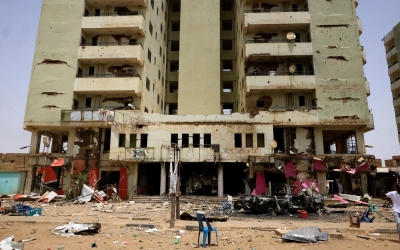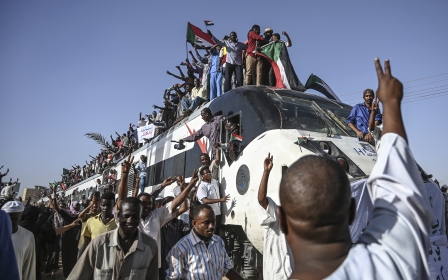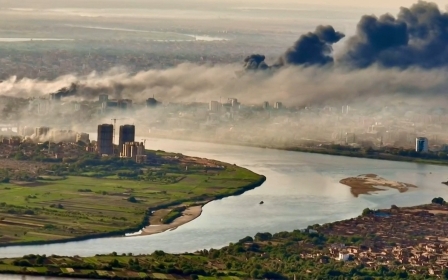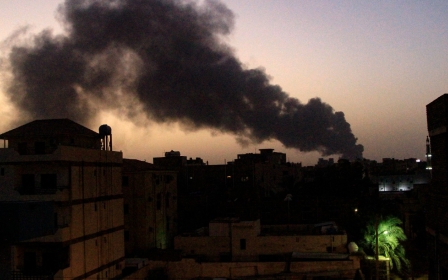Sudan's democracy movement plots way out of war in cradle of the revolution
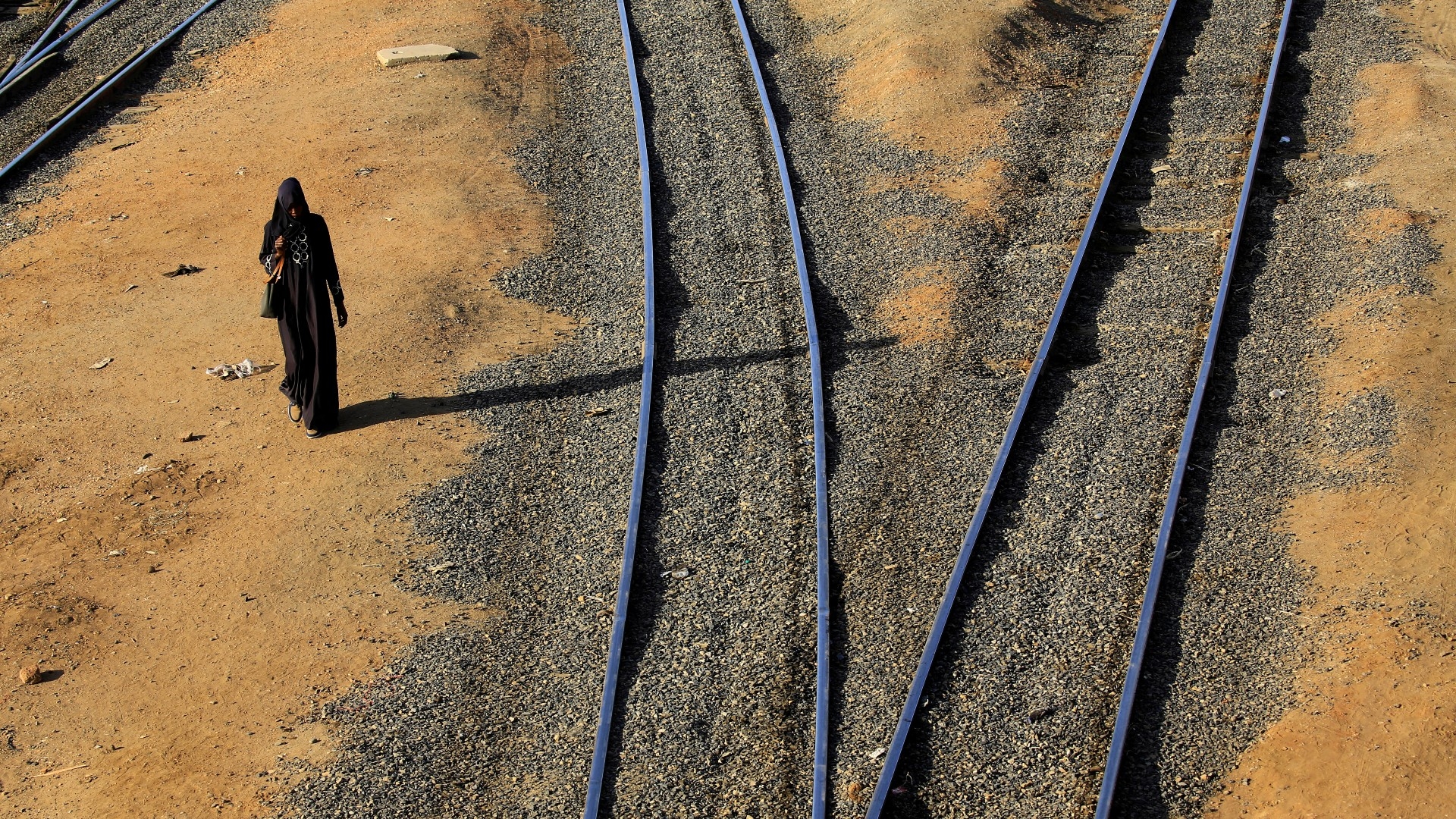
In the city of iron and fire, Sudan's revolutionary movement is trying to plot a way out of the furnace of war.
Atbara, in Sudan's northeast, has been the cradle of many uprisings. It was from here that protests against rising bread prices in December 2018 swept out across Sudan, eventually bringing down longtime autocrat Omar al-Bashir.
And it was from this train-junction city, with its long history of activism centred around the railway union, that protests against British colonial rule and later the Sudanese military began.
In the past fortnight, Sudan's Resistance Committees, a nationwide network of activist cells that were the driving force behind the uprising that swept Bashir out of power in 2019, have been holding "informal but intense discussions" in Atbara, as they seek a way to resume war-torn Sudan's democratic path.
Khalid Abdul al-Ati, a Resistance Committee member from Atbara, told Middle East Eye that members from his city, Khartoum and other centres across Sudan are trying to reorganise themselves in order to stand against both the paramilitary Rapid Support Forces (RSF) and the leadership of the Sudanese army.
New MEE newsletter: Jerusalem Dispatch
Sign up to get the latest insights and analysis on Israel-Palestine, alongside Turkey Unpacked and other MEE newsletters
Ati said the country's pro-democracy revolution had been hijacked by politicians as well as by the RSF and military, which began fighting one another on 15 April as tensions over a transitional political deal boiled over into a full-blown conflict.
"The elites are responsible for the hijacking of the revolution and its great slogans of freedom, peace and justice," he said.
"We are frustrated that Atbara, where the revolution began, is now receiving internally displaced people from Khartoum, instead of us going to Khartoum to join the protests, as we have been for the last four years."
Away from the fighting
The fighting in Sudan has been fiercest in the capital Khartoum and in Darfur, the restive western region that has been in a state of conflict for much of the 21st century. The health ministry says at least 700 people have been killed by the fighting, but the true number is believed to be far higher.
Atbara, far away from both in River Nile state, has been peaceful and is controlled by the army.
On the way here by road from Port Sudan, Middle East Eye passed through three army checkpoints, with soldiers performing minimal checks on those travelling by bus.
But the war has still reached Atbara, just as it has reached every other part of the country. Tens of thousands of internally displaced people from Khartoum have arrived here, filling the city's apartments and hotels. Some are having to sleep on the streets. Some are staying, others are on their way north to Egypt.
The war and the influx of new people means that, as in other comparatively stable outposts such as Port Sudan, prices have gone up. Communications, electricity and internet connections have been adversely affected.
'The elites are responsible for the hijacking of the revolution and its great slogans of freedom, peace and justice'
- Khalid Abdul al-Ati, Resistance Committee member
As the war has brought in varying degrees of interference from regional actors, including Egypt, the Central African Republic and Libyan commander Khalifa Haftar, the long-term aims of the Sudanese pro-democracy movement have been sidelined.
In the absence of international aid agencies, which have only just been allowed to operate in Sudan following the implementation of a short-term ceasefire, which is due to expire on the night of May 29, local activists have been organising the delivery of medical supplies, food, water and other essentials across the country.
For the past week, activists in Atbara have also been turning their attention to strategic planning as they look to influence the future of the country.
Awad Ahmed, an activist and Resistance Committee member, told MEE that they have been gathering in discussion groups to determine what revolutionary path they can take.
"In Arbara today, there are a lot of events, including political discussions, music groups, psychological support groups, free drawing training and other civic activities, so Atbara is still a hub for civic and revolutionary activities," he said.
Resistance Committee members present at the meetings told MEE they were adopting a "neutral" position towards the war. They are against the RSF, led by Mohamed Hamdan Dagalo, commonly known as Hemeti, and they are against the leadership of the army's General Abdel Fattah al-Burhan.
They do, however, maintain some sympathy with the army itself, particularly its younger rank and file.
Activists said they hoped that, just as in 2019, junior army officers could be persuaded to side with the revolution over their commanding officers. There is a hope that by influencing these younger soldiers, the Resistance Committees might be able to turn the Sudanese military into the people's army it claims to be.
Though a leading force in the 2019 pro-democracy revolution, the Resistance Committees were largely sidelined when civilian politicians from the Forces for Freedom and Change coalition formed a transitional government with the military.
Since the 2021 military coup, however, civilian pro-democracy politicians have been sidelined, and attempts by the international community to put Sudan back on a democratic path not only prompted a war to break out, they totally ignored the Resistance Committees at the heart of the grassroots movement.
A history of resistance
While organising amongst Resistance Committee members is taking place across Sudan, the widespread and focused discussions taking place in Atbara are of particular significance.
It was in this working-class northeast city that the biggest protests against British colonial rule erupted, leading eventually to Sudan's independence in 1956. It was here, too, that the Sudanese first rose up against military rule in 1964 and 1985.
Most recently, Atbara was the cradle of the revolution that led to Bashir's removal from power, when teenagers there went into the streets in protest at a steep rise in the price of food.
On 18 December 2018, 17-year old Osama Abdul Gayoum and his friends left their school in Atbara to get breakfast. At the local cafe, they found that there was no bread and that the price of sandwiches had doubled after Bashir's government had decided to strip subsidies from basic commodities.
"We were so angry," Ahmed Mohamed, one of Osama's friends, told Middle East Eye at the time. "Osama was the first to express his anger by kicking the big pot of foul beans to the ground, causing chaos in the entire market.
"The anger immediately became a big protest as hundreds of people joined us, and that was the beginning of the uprising."
This activism did not let up, and the October 2021 military coup led by Burhan and Hemeti was met by rolling demonstrations in Atbara, as the cradle of the revolution reminded Sudan once again of its reputation.
As they were elsewhere, Resistance Committee members were met by the infamous Central Reserve Police, a force sanctioned by the United States over the killing of protesters. Not two years later, they are again looking for a route towards a secure and meaningful democracy.
Middle East Eye delivers independent and unrivalled coverage and analysis of the Middle East, North Africa and beyond. To learn more about republishing this content and the associated fees, please fill out this form. More about MEE can be found here.


